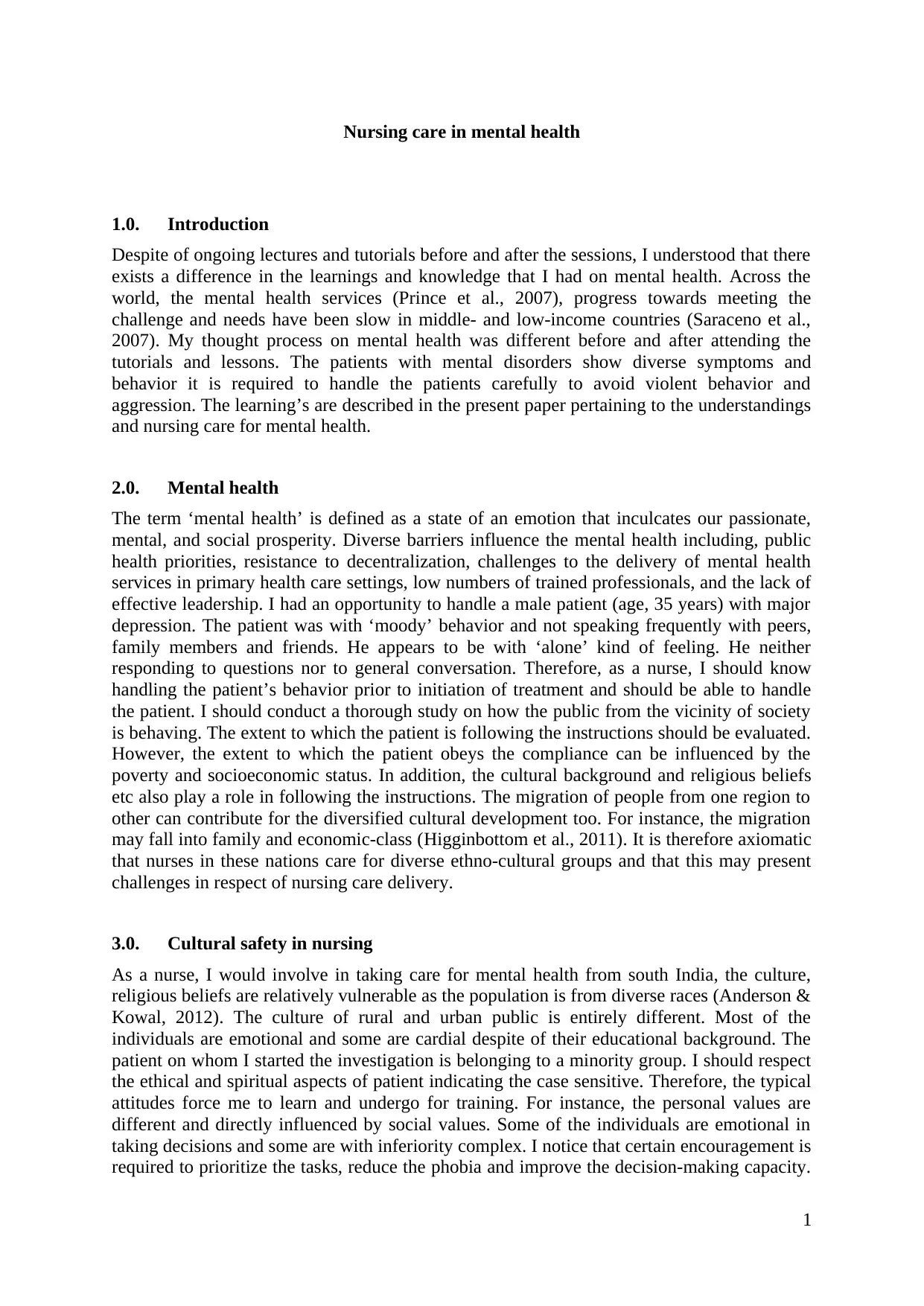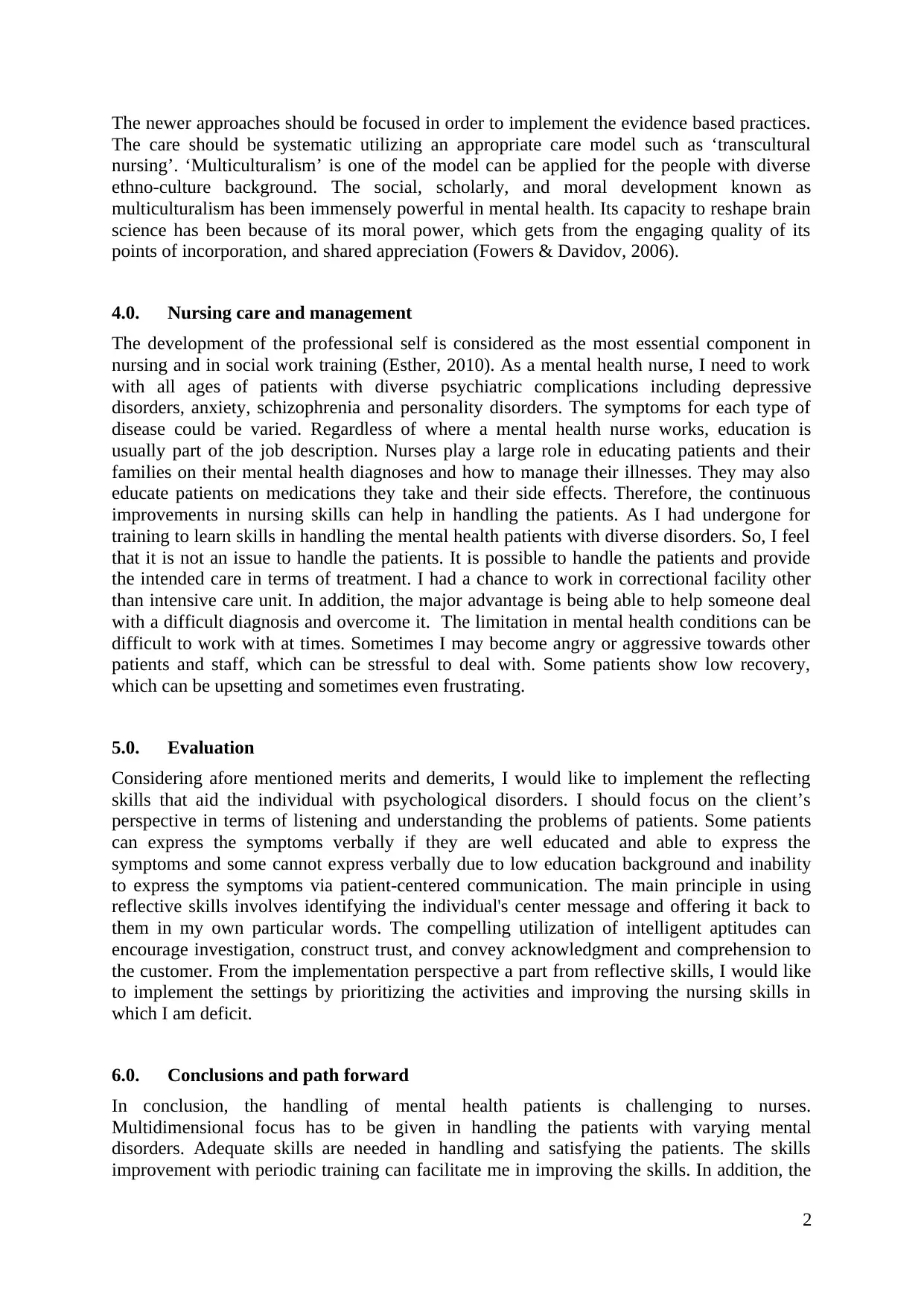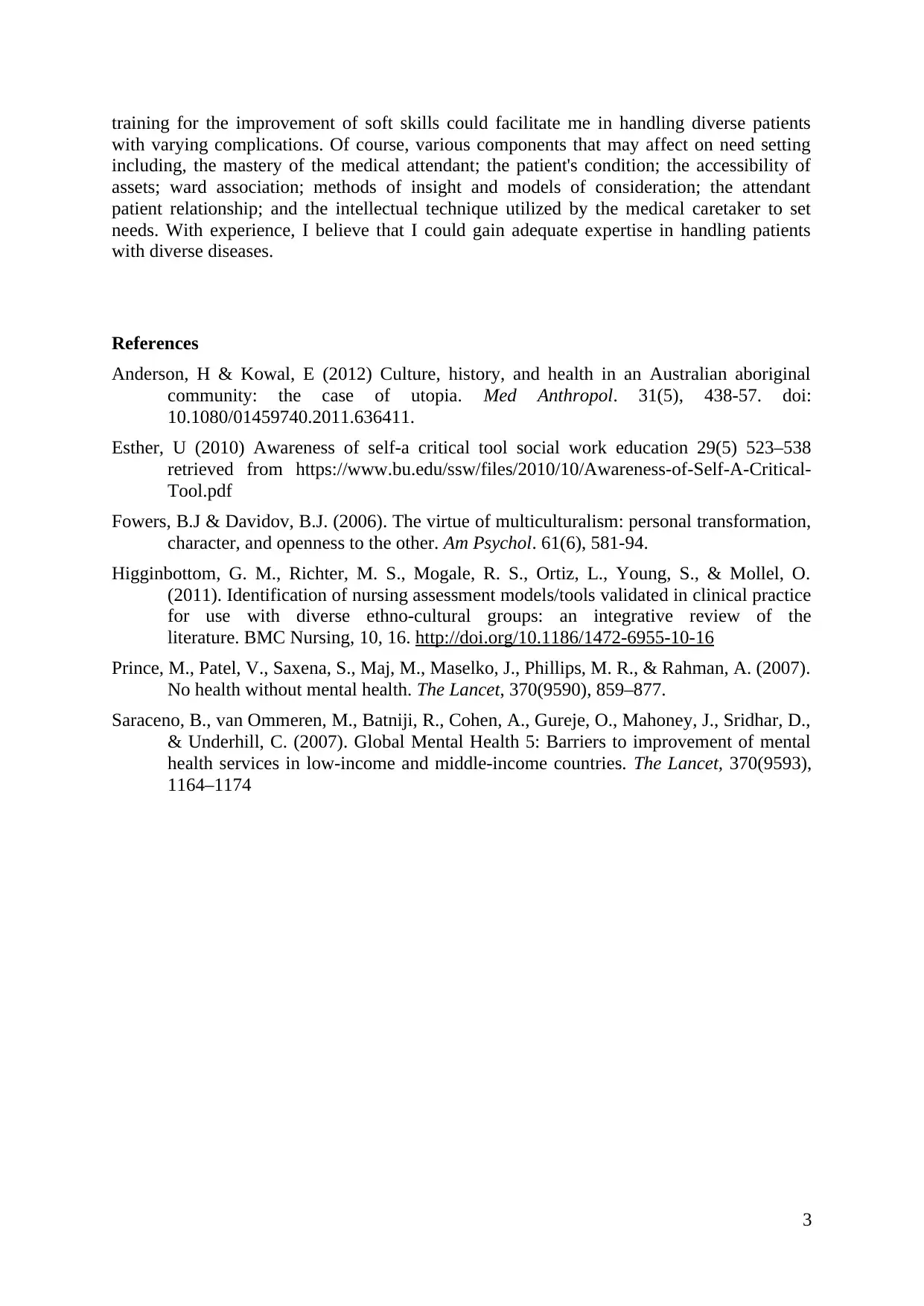Nursing Care in Mental Health: Challenges and Solutions Report
VerifiedAdded on 2019/09/30
|3
|1590
|77
Report
AI Summary
This report provides an overview of mental health nursing care, drawing on the author's experiences and learnings. It addresses the challenges of mental health service delivery, the importance of cultural sensitivity in patient care, and the need for reflective skills. The report highlights the diverse symptoms and behaviors of patients with mental disorders, emphasizing the importance of careful handling to prevent aggression. It discusses the impact of cultural and socioeconomic factors on patient compliance and the application of models like transcultural nursing. Furthermore, the report emphasizes the role of nurses in educating patients and their families, the need for continuous skills improvement, and the implementation of reflective skills to enhance patient care. The author concludes with a path forward focused on gaining expertise in handling patients with diverse diseases and improving soft skills through training.

Nursing care in mental health
1.0. Introduction
Despite of ongoing lectures and tutorials before and after the sessions, I understood that there
exists a difference in the learnings and knowledge that I had on mental health. Across the
world, the mental health services (Prince et al., 2007), progress towards meeting the
challenge and needs have been slow in middle- and low-income countries (Saraceno et al.,
2007). My thought process on mental health was different before and after attending the
tutorials and lessons. The patients with mental disorders show diverse symptoms and
behavior it is required to handle the patients carefully to avoid violent behavior and
aggression. The learning’s are described in the present paper pertaining to the understandings
and nursing care for mental health.
2.0. Mental health
The term ‘mental health’ is defined as a state of an emotion that inculcates our passionate,
mental, and social prosperity. Diverse barriers influence the mental health including, public
health priorities, resistance to decentralization, challenges to the delivery of mental health
services in primary health care settings, low numbers of trained professionals, and the lack of
effective leadership. I had an opportunity to handle a male patient (age, 35 years) with major
depression. The patient was with ‘moody’ behavior and not speaking frequently with peers,
family members and friends. He appears to be with ‘alone’ kind of feeling. He neither
responding to questions nor to general conversation. Therefore, as a nurse, I should know
handling the patient’s behavior prior to initiation of treatment and should be able to handle
the patient. I should conduct a thorough study on how the public from the vicinity of society
is behaving. The extent to which the patient is following the instructions should be evaluated.
However, the extent to which the patient obeys the compliance can be influenced by the
poverty and socioeconomic status. In addition, the cultural background and religious beliefs
etc also play a role in following the instructions. The migration of people from one region to
other can contribute for the diversified cultural development too. For instance, the migration
may fall into family and economic-class (Higginbottom et al., 2011). It is therefore axiomatic
that nurses in these nations care for diverse ethno-cultural groups and that this may present
challenges in respect of nursing care delivery.
3.0. Cultural safety in nursing
As a nurse, I would involve in taking care for mental health from south India, the culture,
religious beliefs are relatively vulnerable as the population is from diverse races (Anderson &
Kowal, 2012). The culture of rural and urban public is entirely different. Most of the
individuals are emotional and some are cardial despite of their educational background. The
patient on whom I started the investigation is belonging to a minority group. I should respect
the ethical and spiritual aspects of patient indicating the case sensitive. Therefore, the typical
attitudes force me to learn and undergo for training. For instance, the personal values are
different and directly influenced by social values. Some of the individuals are emotional in
taking decisions and some are with inferiority complex. I notice that certain encouragement is
required to prioritize the tasks, reduce the phobia and improve the decision-making capacity.
1
1.0. Introduction
Despite of ongoing lectures and tutorials before and after the sessions, I understood that there
exists a difference in the learnings and knowledge that I had on mental health. Across the
world, the mental health services (Prince et al., 2007), progress towards meeting the
challenge and needs have been slow in middle- and low-income countries (Saraceno et al.,
2007). My thought process on mental health was different before and after attending the
tutorials and lessons. The patients with mental disorders show diverse symptoms and
behavior it is required to handle the patients carefully to avoid violent behavior and
aggression. The learning’s are described in the present paper pertaining to the understandings
and nursing care for mental health.
2.0. Mental health
The term ‘mental health’ is defined as a state of an emotion that inculcates our passionate,
mental, and social prosperity. Diverse barriers influence the mental health including, public
health priorities, resistance to decentralization, challenges to the delivery of mental health
services in primary health care settings, low numbers of trained professionals, and the lack of
effective leadership. I had an opportunity to handle a male patient (age, 35 years) with major
depression. The patient was with ‘moody’ behavior and not speaking frequently with peers,
family members and friends. He appears to be with ‘alone’ kind of feeling. He neither
responding to questions nor to general conversation. Therefore, as a nurse, I should know
handling the patient’s behavior prior to initiation of treatment and should be able to handle
the patient. I should conduct a thorough study on how the public from the vicinity of society
is behaving. The extent to which the patient is following the instructions should be evaluated.
However, the extent to which the patient obeys the compliance can be influenced by the
poverty and socioeconomic status. In addition, the cultural background and religious beliefs
etc also play a role in following the instructions. The migration of people from one region to
other can contribute for the diversified cultural development too. For instance, the migration
may fall into family and economic-class (Higginbottom et al., 2011). It is therefore axiomatic
that nurses in these nations care for diverse ethno-cultural groups and that this may present
challenges in respect of nursing care delivery.
3.0. Cultural safety in nursing
As a nurse, I would involve in taking care for mental health from south India, the culture,
religious beliefs are relatively vulnerable as the population is from diverse races (Anderson &
Kowal, 2012). The culture of rural and urban public is entirely different. Most of the
individuals are emotional and some are cardial despite of their educational background. The
patient on whom I started the investigation is belonging to a minority group. I should respect
the ethical and spiritual aspects of patient indicating the case sensitive. Therefore, the typical
attitudes force me to learn and undergo for training. For instance, the personal values are
different and directly influenced by social values. Some of the individuals are emotional in
taking decisions and some are with inferiority complex. I notice that certain encouragement is
required to prioritize the tasks, reduce the phobia and improve the decision-making capacity.
1
Paraphrase This Document
Need a fresh take? Get an instant paraphrase of this document with our AI Paraphraser

The newer approaches should be focused in order to implement the evidence based practices.
The care should be systematic utilizing an appropriate care model such as ‘transcultural
nursing’. ‘Multiculturalism’ is one of the model can be applied for the people with diverse
ethno-culture background. The social, scholarly, and moral development known as
multiculturalism has been immensely powerful in mental health. Its capacity to reshape brain
science has been because of its moral power, which gets from the engaging quality of its
points of incorporation, and shared appreciation (Fowers & Davidov, 2006).
4.0. Nursing care and management
The development of the professional self is considered as the most essential component in
nursing and in social work training (Esther, 2010). As a mental health nurse, I need to work
with all ages of patients with diverse psychiatric complications including depressive
disorders, anxiety, schizophrenia and personality disorders. The symptoms for each type of
disease could be varied. Regardless of where a mental health nurse works, education is
usually part of the job description. Nurses play a large role in educating patients and their
families on their mental health diagnoses and how to manage their illnesses. They may also
educate patients on medications they take and their side effects. Therefore, the continuous
improvements in nursing skills can help in handling the patients. As I had undergone for
training to learn skills in handling the mental health patients with diverse disorders. So, I feel
that it is not an issue to handle the patients. It is possible to handle the patients and provide
the intended care in terms of treatment. I had a chance to work in correctional facility other
than intensive care unit. In addition, the major advantage is being able to help someone deal
with a difficult diagnosis and overcome it. The limitation in mental health conditions can be
difficult to work with at times. Sometimes I may become angry or aggressive towards other
patients and staff, which can be stressful to deal with. Some patients show low recovery,
which can be upsetting and sometimes even frustrating.
5.0. Evaluation
Considering afore mentioned merits and demerits, I would like to implement the reflecting
skills that aid the individual with psychological disorders. I should focus on the client’s
perspective in terms of listening and understanding the problems of patients. Some patients
can express the symptoms verbally if they are well educated and able to express the
symptoms and some cannot express verbally due to low education background and inability
to express the symptoms via patient-centered communication. The main principle in using
reflective skills involves identifying the individual's center message and offering it back to
them in my own particular words. The compelling utilization of intelligent aptitudes can
encourage investigation, construct trust, and convey acknowledgment and comprehension to
the customer. From the implementation perspective a part from reflective skills, I would like
to implement the settings by prioritizing the activities and improving the nursing skills in
which I am deficit.
6.0. Conclusions and path forward
In conclusion, the handling of mental health patients is challenging to nurses.
Multidimensional focus has to be given in handling the patients with varying mental
disorders. Adequate skills are needed in handling and satisfying the patients. The skills
improvement with periodic training can facilitate me in improving the skills. In addition, the
2
The care should be systematic utilizing an appropriate care model such as ‘transcultural
nursing’. ‘Multiculturalism’ is one of the model can be applied for the people with diverse
ethno-culture background. The social, scholarly, and moral development known as
multiculturalism has been immensely powerful in mental health. Its capacity to reshape brain
science has been because of its moral power, which gets from the engaging quality of its
points of incorporation, and shared appreciation (Fowers & Davidov, 2006).
4.0. Nursing care and management
The development of the professional self is considered as the most essential component in
nursing and in social work training (Esther, 2010). As a mental health nurse, I need to work
with all ages of patients with diverse psychiatric complications including depressive
disorders, anxiety, schizophrenia and personality disorders. The symptoms for each type of
disease could be varied. Regardless of where a mental health nurse works, education is
usually part of the job description. Nurses play a large role in educating patients and their
families on their mental health diagnoses and how to manage their illnesses. They may also
educate patients on medications they take and their side effects. Therefore, the continuous
improvements in nursing skills can help in handling the patients. As I had undergone for
training to learn skills in handling the mental health patients with diverse disorders. So, I feel
that it is not an issue to handle the patients. It is possible to handle the patients and provide
the intended care in terms of treatment. I had a chance to work in correctional facility other
than intensive care unit. In addition, the major advantage is being able to help someone deal
with a difficult diagnosis and overcome it. The limitation in mental health conditions can be
difficult to work with at times. Sometimes I may become angry or aggressive towards other
patients and staff, which can be stressful to deal with. Some patients show low recovery,
which can be upsetting and sometimes even frustrating.
5.0. Evaluation
Considering afore mentioned merits and demerits, I would like to implement the reflecting
skills that aid the individual with psychological disorders. I should focus on the client’s
perspective in terms of listening and understanding the problems of patients. Some patients
can express the symptoms verbally if they are well educated and able to express the
symptoms and some cannot express verbally due to low education background and inability
to express the symptoms via patient-centered communication. The main principle in using
reflective skills involves identifying the individual's center message and offering it back to
them in my own particular words. The compelling utilization of intelligent aptitudes can
encourage investigation, construct trust, and convey acknowledgment and comprehension to
the customer. From the implementation perspective a part from reflective skills, I would like
to implement the settings by prioritizing the activities and improving the nursing skills in
which I am deficit.
6.0. Conclusions and path forward
In conclusion, the handling of mental health patients is challenging to nurses.
Multidimensional focus has to be given in handling the patients with varying mental
disorders. Adequate skills are needed in handling and satisfying the patients. The skills
improvement with periodic training can facilitate me in improving the skills. In addition, the
2

training for the improvement of soft skills could facilitate me in handling diverse patients
with varying complications. Of course, various components that may affect on need setting
including, the mastery of the medical attendant; the patient's condition; the accessibility of
assets; ward association; methods of insight and models of consideration; the attendant
patient relationship; and the intellectual technique utilized by the medical caretaker to set
needs. With experience, I believe that I could gain adequate expertise in handling patients
with diverse diseases.
References
Anderson, H & Kowal, E (2012) Culture, history, and health in an Australian aboriginal
community: the case of utopia. Med Anthropol. 31(5), 438-57. doi:
10.1080/01459740.2011.636411.
Esther, U (2010) Awareness of self-a critical tool social work education 29(5) 523–538
retrieved from https://www.bu.edu/ssw/files/2010/10/Awareness-of-Self-A-Critical-
Tool.pdf
Fowers, B.J & Davidov, B.J. (2006). The virtue of multiculturalism: personal transformation,
character, and openness to the other. Am Psychol. 61(6), 581-94.
Higginbottom, G. M., Richter, M. S., Mogale, R. S., Ortiz, L., Young, S., & Mollel, O.
(2011). Identification of nursing assessment models/tools validated in clinical practice
for use with diverse ethno-cultural groups: an integrative review of the
literature. BMC Nursing, 10, 16. http://doi.org/10.1186/1472-6955-10-16
Prince, M., Patel, V., Saxena, S., Maj, M., Maselko, J., Phillips, M. R., & Rahman, A. (2007).
No health without mental health. The Lancet, 370(9590), 859–877.
Saraceno, B., van Ommeren, M., Batniji, R., Cohen, A., Gureje, O., Mahoney, J., Sridhar, D.,
& Underhill, C. (2007). Global Mental Health 5: Barriers to improvement of mental
health services in low-income and middle-income countries. The Lancet, 370(9593),
1164–1174
3
with varying complications. Of course, various components that may affect on need setting
including, the mastery of the medical attendant; the patient's condition; the accessibility of
assets; ward association; methods of insight and models of consideration; the attendant
patient relationship; and the intellectual technique utilized by the medical caretaker to set
needs. With experience, I believe that I could gain adequate expertise in handling patients
with diverse diseases.
References
Anderson, H & Kowal, E (2012) Culture, history, and health in an Australian aboriginal
community: the case of utopia. Med Anthropol. 31(5), 438-57. doi:
10.1080/01459740.2011.636411.
Esther, U (2010) Awareness of self-a critical tool social work education 29(5) 523–538
retrieved from https://www.bu.edu/ssw/files/2010/10/Awareness-of-Self-A-Critical-
Tool.pdf
Fowers, B.J & Davidov, B.J. (2006). The virtue of multiculturalism: personal transformation,
character, and openness to the other. Am Psychol. 61(6), 581-94.
Higginbottom, G. M., Richter, M. S., Mogale, R. S., Ortiz, L., Young, S., & Mollel, O.
(2011). Identification of nursing assessment models/tools validated in clinical practice
for use with diverse ethno-cultural groups: an integrative review of the
literature. BMC Nursing, 10, 16. http://doi.org/10.1186/1472-6955-10-16
Prince, M., Patel, V., Saxena, S., Maj, M., Maselko, J., Phillips, M. R., & Rahman, A. (2007).
No health without mental health. The Lancet, 370(9590), 859–877.
Saraceno, B., van Ommeren, M., Batniji, R., Cohen, A., Gureje, O., Mahoney, J., Sridhar, D.,
& Underhill, C. (2007). Global Mental Health 5: Barriers to improvement of mental
health services in low-income and middle-income countries. The Lancet, 370(9593),
1164–1174
3
⊘ This is a preview!⊘
Do you want full access?
Subscribe today to unlock all pages.

Trusted by 1+ million students worldwide
1 out of 3
Related Documents
Your All-in-One AI-Powered Toolkit for Academic Success.
+13062052269
info@desklib.com
Available 24*7 on WhatsApp / Email
![[object Object]](/_next/static/media/star-bottom.7253800d.svg)
Unlock your academic potential
Copyright © 2020–2026 A2Z Services. All Rights Reserved. Developed and managed by ZUCOL.





